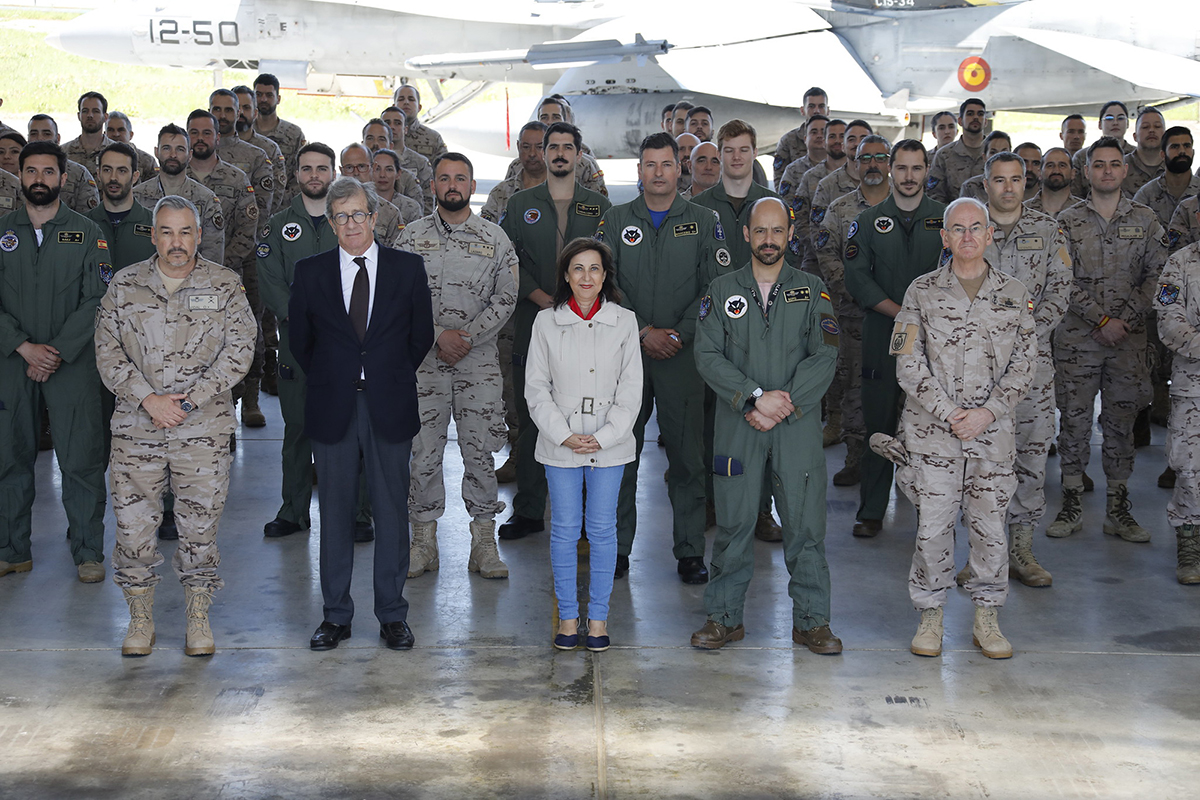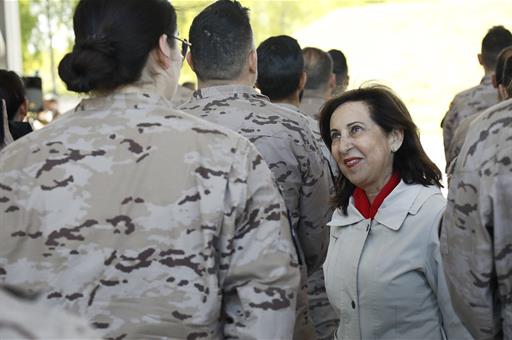Robles visits the Spanish contingent reinforcing NATO's eastern flank in Lithuania and acknowledges its work for peace
News - 2022.5.23
A total of 140 Spanish military personnel and eight F-18 aircraft currently form part of this detachment on a mission to which the member countries of the Atlantic Alliance contribute on a rotating basis, and which guarantees collective allied defence within the airspace of the Baltic republics, preserving the inviolability of their skies. Following the outbreak of war between Russia and Ukraine, it has taken on other tasks such as border surveillance and training.
Robles praised the detachment's crucial work in achieving peace in "difficult times", as well as its role within the Alliance. "It is a source of pride to know that our Armed Forces are constantly working for peace with efficiency, training and preparation," said the minister in her words of thanks to the members of the detachment, while at the same time expressing her wish that "this war will soon be over".
NATO and Spain, as a serious and committed ally, owe you and always will owe you an enormous debt of gratitude. "Congratulations on ensuring that Spain has an international presence," added Robles, who travelled to Lithuania together with the Chief of Defence Staff (JEMAD), Admiral General Teodoro López Calderón.
 Family photo of the visit of Minister Margarita Robles to the Spanish contingent in Lithuania
Family photo of the visit of Minister Margarita Robles to the Spanish contingent in Lithuania
On her arrival at the Siauliai air base, the minister, who was also accompanied by the Spanish ambassador to Lithuania, José María Robles, was received by authorities, including the Chief of the General Staff of the Republic of Lithuania, Lieutenant General Valdemaras Rupsys, the Lithuanian Deputy Minister of National Defence, Zilvinas Tomkus, and the acting head of the Siauliai air base, Lieutenant Colonel Eligijus Ruksnaitis.
The Minister of Defence then went to the 'Vilkas' Tactical Air Detachment, where she attended the raising of the flag and an act of homage to the fallen, in commemoration of the Armed Forces Day to be held on 28 May.
The Tactical Air Detachment 'Vilkas' (meaning wolf in Lithuanian), made up of 15 different units, is composed of 12th Wing troops and is under the operational control of the Operations Command (MOPS). Six of the Spanish fighters are on loan under Alliance control and the other two remain under national control to ensure mission accomplishment. The bulk of the contingent is at the Siauliai base.
Aircraft identification
On 1 April, Tactical Air Detachment 'Vilkas' aircraft entered Quick Reaction Alert (QRA) service, which provides air policing with fighter aircraft with a 15-minute reaction and take-off time. The "Vilkas" aircraft are capable of intercepting, identifying and intervening with unidentified or hostile aircraft in the Alliance's eastern airspace.
The Minister for Defence attended a briefing by the Force Commander of the detachment, Lieutenant Colonel David Soto Martínez, where he explained that since they entered service, they have carried out 200 sorties, twelve 'alpha scramble' alerts and a total of 380 flight hours.
Robles was able to see first hand how the QRA service works, and during her visit she spoke with one of the pilots, who explained to her what the aircraft are like and their flight characteristics. Afterwards, she also met with flight and maintenance personnel and mechanics, who explained the dynamics of their work.
Because of the measures taken on NATO's eastern flank following Russia's invasion of Ukraine, the detachment has taken on other missions such as border surveillance patrols in the Baltic states and eVA (enhanced Vigilance Activity) missions to reinforce surveillance in certain CAP (Combat Air Patrol) areas.
Also in connection with the Ukraine crisis, the Alliance has decided to reinforce integration and training efforts. Providing the same service at the Siauliai base as the Spanish aircraft are four JAS 39 Gripen aircraft from the Czech Republic Air Force.
Before the end of the visit, the minister spoke with the Deputy Minister for National Defence of the Republic of Lithuania, Zilvinas Tomkus, who expressed his gratitude for the continued presence of Spanish troops in the area.
"It is very important for us that your soldiers are in Lithuania. I thank you for being here and for the fact that your soldiers are protecting our security in our region," said the Lithuanian deputy minister.
Eight participations by Spain
The accession of the Baltic states to NATO in 2004 extended allied airspace to northeastern Europe bordering Russia. The Alliance, in keeping with its commitment to solidarity and with the goal of having an air defence capability throughout its territory, decided to create the BAP to make up for the new members' lack of a combat air force (Estonia, Latvia and Lithuania).
Following Russia's invasion of the Crimean peninsula in 2014, the Alliance implemented a series of deterrence and response measures, including the integration of all NATO air defence systems.
Since 2006, Spain has participated eight times in this mission and has acted as lead country in four of them. Their service will end on 1 August, when they will be relieved by Hungarian aircraft.
Between 22 August and 12 September 2022, four Spanish Armed Forces Eurofighters are scheduled to deploy to Amari, Estonia, to support the German air detachment in Estonia and to perform German and Spanish Eurofighter interoperability activities.
Non official translation





